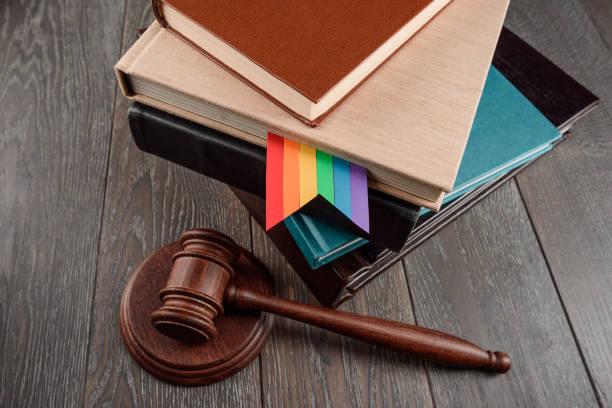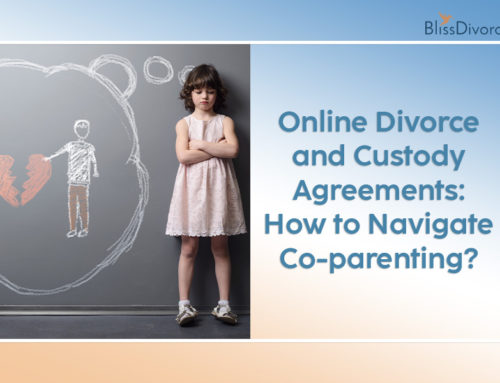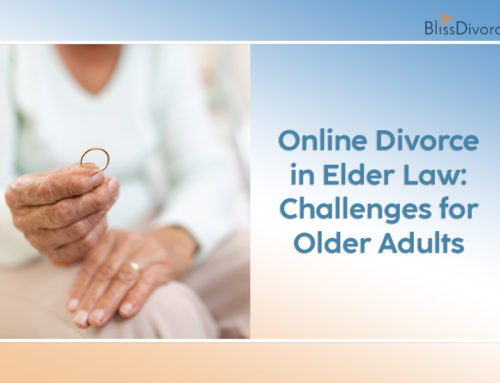Please note that all online divorce platforms are not the same. Much of the content below does not apply to BlissDivorce. BlissDivorce is the only complete online divorce solution, including property division, child custody, spousal support, and AI-powered Digital Divorce Mediation.
Even considering getting a divorce is a difficult decision for all couples. Ending a marriage can be devastating for everyone involved. Countless issues occur during this process, especially for people from the LGBTQ+ community. This makes the process a lot more complex. That’s why this article will focus on the legal rights of LGBTQ+ individuals in online divorce.
Most states and countries legalized LGBTQ+ marriage, along with divorce. But there are several complications you’ll encounter along the way. We understand the difficulties and complexities of a divorce, especially when many LGBTQ+ rights are still to be discussed and approved. Yet, there are ways you can divorce your partner that are less costly and stressful. So, choosing the right path, maybe outside the legal court system, is your most important step.
Continue reading this article to discover about online divorce and the legal rights LGBTQ+ individuals have for divorces. Learn more about the settlements and conditions you’ll have to go through with your partner.
LGBTQ+ Individuals in Online Divorce
Any of us can form a romantic relationship and create plans together. No matter the sexual orientation, couples may share the same hopes and dreams. Yet, most marriages nowadays go through difficult times in their union, which can sometimes lead to separation and divorce.
In such cases, finding a safe and subtle way to separate is crucial. LGBTQ+ couples especially need correct and efficient guidance for their legal divorce forums.
Online divorce is something most couples turn to in the past period. The discreet and peaceful way to end a marriage is undoubtedly like to replace traditional attorney-assisted divorce trials. Thus, it will save you a lot of money and stress.
Through online divorce services, LGBTQ+ couples can feel safer and avoid being judged.

Source: shutterstock.com / Photo Contributor: Valery Evlakhov
What is an online divorce?
An online divorce service is an internet-based program for divorcing couples. In this process, spouses go through all the needed forums to file a divorce. Online divorce instructors help partners go through legal matters within the LGBTQ+ community.
The online divorce program is a fast and reliable solution to end a marriage. But it’s important to mention that this program doesn’t complete your divorce. Only a judge can do that. This process only helps you review the legal terms and paperwork during your divorce.
Benefits of online divorce for LGBTQ+ couples
Online divorce is discreet and reliable when preparing forms for divorce, as the service you hire already has the required state-specific forms. But besides that, online divorce services come with several benefits for LGBTQ+ couples. With the help of instructors, you can easily understand everything you need to file for divorce.
Apart from the help, it’s an affordable solution to get divorced. This program helps you review all your divorce documents at an exceptional cost.
Another benefit is the reduction of risk. This program minimizes potential risks that can impact your filing. Since these instructors deal with all your legal rights, you don’t have to worry about anything. It’s also notable that these procedures are private. So your private information is in safe hands.
The online divorce service is a fast and carefree solution for separation. If things go smoothly, you can expect to complete the divorce in a few weeks. In contrast, traditional court divorce may take months to finish.
LGBTQ+ Divorce Basics and Residential Requirements
Online divorce is a cost-friendly and simple solution for every couple. They will walk you through the whole process. Online divorce instructors will prepare all your forums and may even file them for you.
But, while the divorce process may be easy, filling and learning about the state laws is not a piece of cake. The basics of divorce and its procedures are the same for every couple. Whether heterosexual or LGBTQ+, you must meet the following:
-
Residency
Most states have requirements for how long couples have lived in the residence. In most states, one of the spouses must be a resident for six months before filing for divorce. But you should do your research and check if this requirement is the same within your state.
If you were married in another state, you need to get divorced in the state of your current residence. But, if the state you reside in doesn’t support LGBTQ+ marriages, you could get divorced in the state where you were married.
Legally accepted reason for divorce
You must give an acceptable reason why you want a divorce. Some states have the no-fault option. This is an option where you don’t have to state a specific problem of the dissolution of a marriage.
But there are still states that require fault-based grounds, where you need to blame the divorce on the other spouse, be it for infidelity, adultery, or something completely different.

Source: shutterstock.com / Photo Contributor: Yuriy Golub
Settlements for LGBTQ+ Couples During a Divorce
A decade ago, LGBTQ+ couples couldn’t even think about sharing their happiness in a marriage with someone. Now, they’re protected by federal law, which allows couples to get married or divorced, respectively.
For a divorce to be “settled,” both parties must agree on some issues. An online divorce service will walk you through those terms and conditions. Some of the settlements you should discuss include the following:
- Property Division
- Alimony
- Child custody
- Child support
Every state has its own conditions and requirements around divorce and marriage, especially for LGBTQ+ unions. Researching your state’s residential requirements for LGBTQ+ individuals is crucial.
Property Division
LGBTQ+ couples, just like other-sex couples, may have more issues around property division.
Most states equally divide the property among both partners. This includes assets such as real estate and personal property. It also divides retirement and bank accounts. In layman’s terms, everything you bought during the marriage is now divided in half.
Yet, you might have extra issues with the assets you bought together before LGBTQ+ marriage became legal. The court may not recognize the joint purchases. At least not before the legalization of same-sex marriage. Unfortunately, in most cases, the court assigns the bought properties or debts to the spouse who made the purchase.
The property division settlement may include the assets purchased after the legalization. So this may not be fair for LGBTQ+ couples who’ve invested together in properties.
In most cases, the court may be able to determine if the property division is fair. Yet, this cannot be guaranteed.
Alimony
LGBTQ+ couples are entitled to spousal support like heterosexual couples. Yet, this situation can get complicated. The individual state laws may impact this settlement, so research your residence requirements.
You should consider the time when LGBTQ+ marriage was legalized in your state and consider the length of your marriage. But at this point, LGBTQ+ marriages don’t have the benefit of marital longevity. In cases like this, the online divorce service takes an in-depth look into your marriage to determine the alimony.
Child custody
Each state follows its own rules on child custody. LGBTQ+ couples can have families just like heterosexual ones, whether it’s through adoption, donor insemination, or surrogacy. However, parental legal rights can get a little complicated.
If both partners have equal parental rights, child custody will be the same as a straight divorce. LGBTQ+ couples have the same obligations and custodial rights as heterosexual spouses.
Unfortunately, both partners can’t be biological parents of their children. So, only one of you is recognized as a legal parent, which can unveil deep-rooted issues during the divorce.
The non-biological parent may have minimal parental rights over the child. But with the help of online divorce services, you can come to a mutual agreement that can work great for both. In cases like this, it may be better to consult with an online service rather than rely on the court system.
Child support
In most states, the laws for child support are the same for all marriages. Each parent has financial responsibilities for their children. But LGBTQ+ unions may vary depending on the legal parental rights over the kids.
If you’ve adopted, both parents share the obligations for the child’s upbringing. The court determines this kind of child support based on your state’s guidelines.
If you’ve conceived a child with donor insemination, it may be the same as custody. The states differ on how they view the non-biological parent’s responsibilities. Meaning that you may not consider the responsibilities of the non-biological parent. This can leave the biological parent with all the financial impact on the child.

Source: shutterstock.com / Photo Contributor: Prostock-studio
Conclusion
In conclusion, LGBTQ+ rights have come a long way in the past few years. LGBTQ+ people have rights to marriage as well as divorce. But, the laws may be a little different from heterosexual ones. The court’s view of an LGBTQ+ marriage is essential for the best outcomes.
Regardless of the case, the online divorce service will handle all the paperwork. They will consult and advise you on the whole procedure. Remember to research your residential requirements. We hope we’ve provided insight into LGBTQ+ individuals in online divorce.



